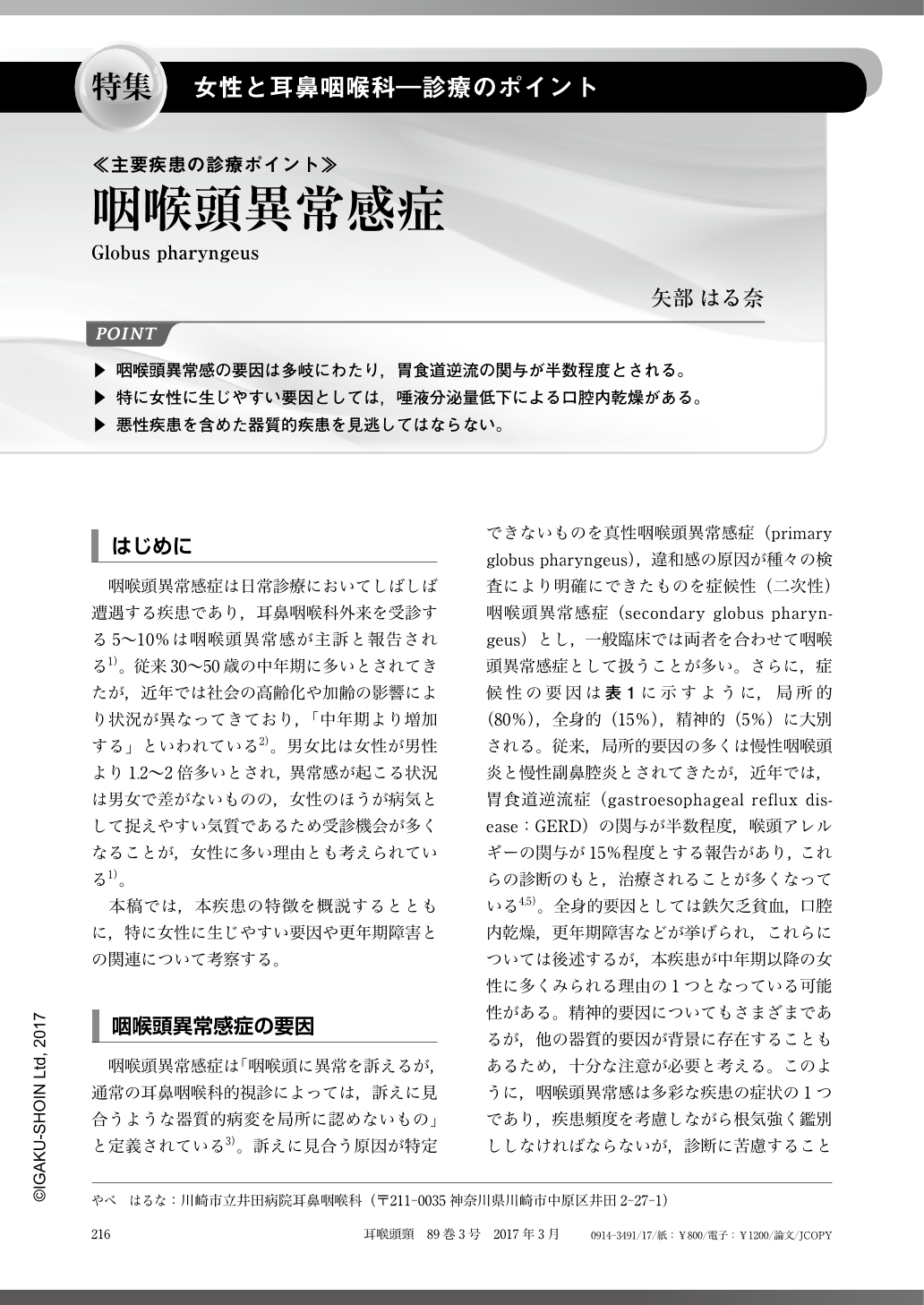2 0 0 0 OA いわゆる“脳トレーニング”によって語音明瞭度の改善した感音性難聴症例
- 著者
- 五島 史行 矢部 はる奈
- 出版者
- The Japan Society of Logopedics and Phoniatrics
- 雑誌
- 音声言語医学 (ISSN:00302813)
- 巻号頁・発行日
- vol.49, no.4, pp.273-276, 2008-10-20 (Released:2010-06-22)
- 参考文献数
- 5
- 被引用文献数
- 2 1
難聴を一定期間放置すると語音明瞭度が低下することは長期間の難聴に伴う聴取能の剥離として知られている.高齢者の補聴器装用者の問題は語音明瞭度の低下によるものが多い.近年, 言語聴覚士の積極的介入を軸とした補聴器フィッティング, 装用訓練を導入し補聴器装用訓練が奏功する可能性が報告された.言語聴覚士を積極的に活用できる医療施設等は限定されるため, より簡便な聴能回復リハビリテーション法が必要である.今回われわれは, 自宅での音読トレーニングなどを指導することによって裸耳の語音明瞭度の改善を認めた症例を経験したので報告する.症例は77歳女性.2005年7月に感音難聴を主訴に初診.両側高度感音難聴を認めた.語音明瞭度は右30%, 左20%であった.書籍“脳を鍛える大人の音読ドリル―名作音読・漢字書き取り60日”を用いたトレーニング, 新聞の音読をすることを指示した.6ヵ月後右耳の語音明瞭度は60%まで改善した.
1 0 0 0 OA 携帯型中耳加圧装置メニエット®によるメニエール病の治療経験
- 著者
- 矢部 はる奈 五島 史行 林 賢 國弘 幸伸 小川 郁
- 出版者
- 耳鼻咽喉科臨床学会
- 雑誌
- 耳鼻咽喉科臨床 (ISSN:00326313)
- 巻号頁・発行日
- vol.100, no.6, pp.491-495, 2007-06-01 (Released:2011-10-07)
- 参考文献数
- 15
- 被引用文献数
- 1 1
It is not easy to treat patients with intractable Meniere's disease. Intratympanic injection of gentamicin or steroid is one option. The other is a surgical procedure like endolymphatic shunt surgery. Middle ear pressure treatment using the Meniett device, which has not been approved by the Japanese government is widely accepted in foreign countries. We had a chance to use this Meniett device under approval of the ethic's committee of Hino Municipal Hospital since September 2004. ‹Methods› Four patients with intractable Meniere's disease who suffered intensive vertigo attack for more than 5 months with conservative medical treatment were employed in the study. Ages ranged from 67 to 72, with 3 females and 1 male. After a ventilation tube was inserted under local anesthesia, treatment with the Meniett was performed 3 times a day at home. ‹Results› Two patients improved and 2 slightly improved concerning vertigo attacks. One showed no change, 1 experienced a worsening, and 2 showed slight improvement concerning the hearing level. ‹Conclusion› The Meniett device is less invasive and may be suitable for elderly patients who prefer conservative treatment. The mechanism involved in the reduction of vertigo attacks is not clear so far, but we speculate that middle ear pressure may suppress serum vasopressin (antidiuretic hormone) secretion and thereby reduce endolymphatic hydrops. It is necessary to accumulate treatment data with the Meniett in Japan to obtain official approval by the government.
- 著者
- 五島 史行 矢部 はる奈 五島 一吉 小川 郁
- 出版者
- 耳鼻咽喉科展望会
- 雑誌
- 耳鼻咽喉科展望 (ISSN:03869687)
- 巻号頁・発行日
- vol.50, no.5, pp.330-332, 2007
"Ear popper<SUP>®</SUP>" は自宅または外来で小児滲出性中耳炎に対する通気を行うための機器である。外来にてポリッツエル球の代わりに本機を用いて2歳から9歳の小児滲出性中耳炎症例18例 (男児8例, 女児10例) に対して通気治療を行った。通気治療前後の鼓膜, ティンパノグラム, 聴力検査所見により評価を行った。<BR>〈結果〉17例において苦痛なく確実に通気可能であった。〈まとめ〉日本では国民皆保険制度が整備され, 医療機関へのアクセスも比較的容易なため患者自身で病気を治療しようという意欲はアメリカに比べると低い。また自治体によっては小児の医療費は無料であり通院治療が経済的には負担にならないため在宅治療器の普及はあまり進んでいない。今回は外来での使用にとどまったが頻回な通院が必要な難治性の滲出性中耳炎児に対しては容易に在宅でも通気治療できる本装置のメリットは大きいと考えられた。
1 0 0 0 心因性発声障害の治療経験
1 0 0 0 咽喉頭異常感症
1 0 0 0 OA 耳鼻咽喉科外来ヘッドライトの自作・改造
- 著者
- 五島 史行 矢部 はる奈
- 出版者
- 耳鼻咽喉科展望会
- 雑誌
- 耳鼻咽喉科展望 (ISSN:03869687)
- 巻号頁・発行日
- vol.49, no.3, pp.142-144, 2006-06-15 (Released:2011-08-16)
- 参考文献数
- 3
耳鼻咽喉科外来で, 一般的に使用する照射装置としてユニットのライトを光源とし, 額帯鏡による反射光で診察するのが一般的であった。最近消費電力が少なく, 明るい高輝度白色LEDの開発によってヘッドライトのコードレス化が可能となってきた。しかし市販されているものは, バッテリの持続時間などの問題がある。市販のヘッドライトを改造し, 問題点の改善を試みた。使用したものは白色LEDヘッドライト (IWポータブルヘッドライト®Welch Allyn), 携帯電話用外部バッテリ (My Battery mini®日本トラストテクノロジー) などである。バッテリによる連続照射時間は2時間以上可能であった。白色LEDは低消費電力で発熱も少なく優れた光源装置である。しかし額帯鏡に慣れ親しんだ医師にとって明るすぎたり, 光の色調が異なるなど相違点もある。直視することがなければ現在のところは問題がないとされている。診察用のユニットのライトと額帯鏡の格闘から逃れられる喜びは患者医師ともに大きい。
1 0 0 0 めまい急性期における薬物選択
- 著者
- 五島 史行 矢部 はる奈 小川 郁
- 出版者
- 耳鼻咽喉科臨床学会
- 雑誌
- 耳鼻咽喉科臨床 (ISSN:00326313)
- 巻号頁・発行日
- vol.102, no.4, pp.315-320, 2009 (Released:2010-12-04)
- 参考文献数
- 15
- 被引用文献数
- 1 1
Introduction: Treatments for acute peripheral vertigo have not been well investigated. The most suitable drug for controlling acute vertigo should suppress both vertigo and accompanying nausea. The purpose of this study was to evaluate the effect of four different drugs on acute peripheral vertigo: (A) hydroxyzine hydrochloride (25 mg, i.v.); (B) 0.5% metoclopramide (2 ml, i.v.); (C) sodium bicarbonate (40 ml, i.v.); and (D) a cocktail of diphenhydramine hydrochloride (30 mg) and dyprophylline (26 mg) (both i.m.). Methods: Forty-two patients with acute peripheral vertigo (average age: 59.5±18.1 years) with spontaneous nystagmus were assigned to four treatment groups (A-D, above). Patients with central vertigo and vestibular neuritis were excluded. The number of patients in each group was as follows: A, n=11; B, n=11; C, n=11; and D, n=9. Patients were instructed to evaluate their subjective symptoms of nausea and vertigo before and 30 minutes after drug treatment. They rated the severity of their symptoms on a 0-to-10 scale, with 10 representing the most severe symptoms and 0 a lack of symptoms. Results: Group A patients (hydroxyzine hydrochloride; 25 mg, i.v.) reported the highest level of relief from vertigo and nausea after drug treatment, whereas group C (sodium bicarbonate; 40 ml, i.v.) and D (diphenhydramine hydrochloride (30 mg)-dyprophylline (26 mg) cocktail; i.m.) patients reported only the slight relief of these symptoms. Group B patients (0.5% metoclopramide; 2 ml, i.v.) experienced partial symptom relief; their vertigo remained unchanged. Thus, hydroxyzine hydrochloride (A) was the most effective in controlling both nausea and vertigo, whereas sodium bicarbonate (C) and diphenhydramine hydrochloride and dyprophylline (D) only slightly suppressed vertigo and nausea. Metoclopramide (B) only suppressed nausea. Conclusions: Hydroxyzine hydrochloride (A) was the most suitable for treating acute peripheral vertigo. Doctors should be familiar with the contraindications of these drugs. Some of these drugs may potentially be used in combination to control the symptoms of acute vertigo more effectively.
